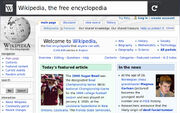
Firefox logo.

Fennec 1.0 displaying Wikipedia.
Mozilla's Fennec, or Firefox for mobile, is the name of the build of the Mozilla Firefox web browser for ARM devices such as mobile phones and personal digital assistants (PDAs).
Fennec 1.0 uses the same version of the Gecko layout engine as Firefox 3.6. Its features include tabbed browsing, password manager, location-aware browsing, and the ability to synchronize with the user's computer Firefox browser using Firefox Sync. Plugin support was initially disabled by default, removing compatibility with popular web content types such as Adobe Flash. As of October 2009, Flash is supported.
The user interface is completely redesigned for small screen optimization, the controls are hidden away so that only the web content is shown on screen and it uses touchscreen interaction methods in place of dragging actions with a mouse.
It is currently available for Nokia Maemo. The browser is optimized for the Nokia N900, and is also available on Nokia N810 and N800 Internet Tablets. An alpha release of version 2.0 for the Android and version 1.1 for Windows Mobile are available. Following the Windows Phone 7 announcement and Microsoft's decision not to release a native development kit, development for Windows Mobile was put on hold. If Microsoft releases a native development kit in the future for its Windows Phone 7 OS, then Mozilla will consider developing Fennec on the Windows Phone platform again.
Mozilla has no plans to develop Firefox for Palm's WebOS, however an unofficial port to WebOS has begun. An unofficial port is also available for the OpenPandora Handheld.
Tristan Nitot, president of Mozilla Europe, has said that it's unlikely that an iPhone or a BlackBerry version will be released, citing Apple's non-compete application approval policies and BlackBerry's limited operating system as the reasons. There are no plans to develop Firefox for the Symbian platform.
While desktop versions are not supported, versions for Microsoft Windows, Mac OS X and Linux are available, these versions are intended as a way to give people who do not have a supported operating system the ability to localize, experiment and build add-ons.
| This page uses Creative Commons Licensed content from Wikipedia (view authors). |
